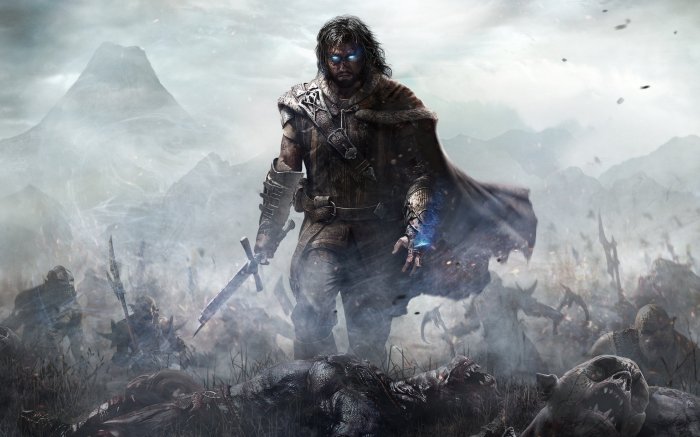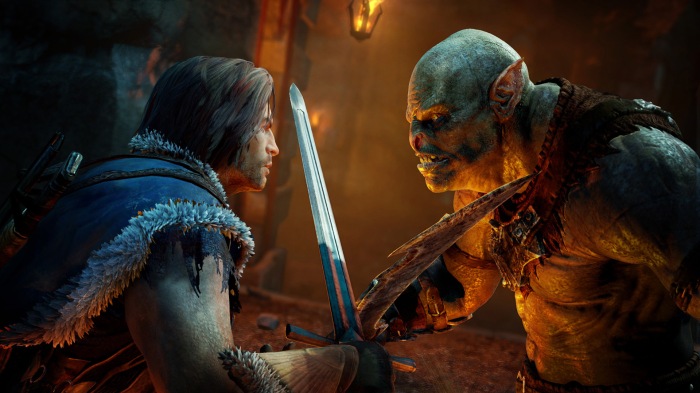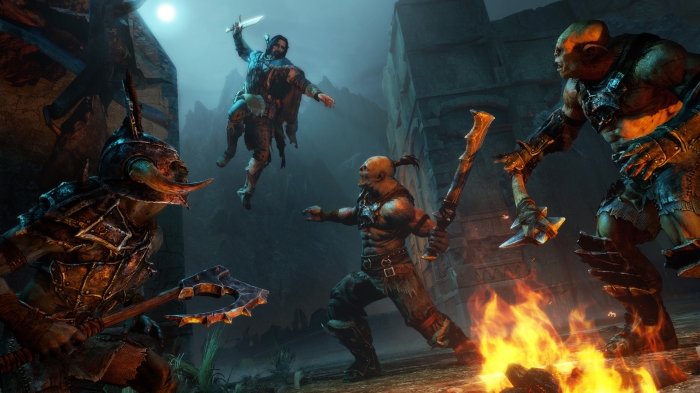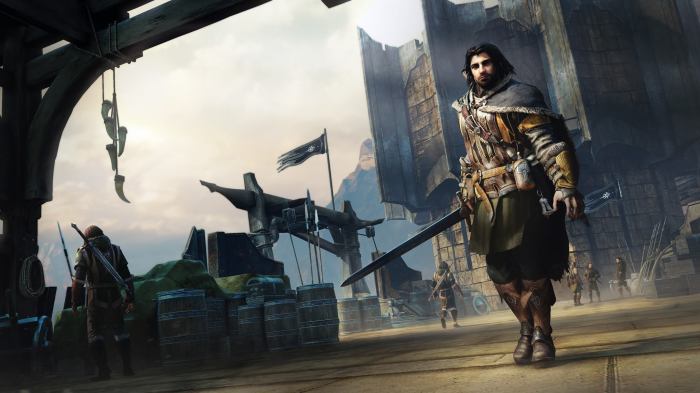Title: Middle-earth: Shadow of Mordor
Alternative titles: Middle-earth, Shadow of Mordor, Lord of the Rings: Shadow of Mordor
Developers: Monolith Production, Behaviour Interactive Inc. (PS3/X360)
Publishers: Warner Bros. Interactive Entertainment
Genre: Action-adventure/Hack n’ Slash/Stealth
Engine: LithTech
Format: PS3/X360/PS4 (reviewed)/X1/PC
Release: September 30, 2014

Bend Mordor to your will
Shadow of Mordor is the best game based on Lord of the Rings ever made. Not that it is such an honor as it seems like at first: Tolkien’s rich and classic fantasy universe started as a series of books that are now considered to be some of the best ever written (and also the most commercially successful in the world), while the film adaptations have grossed billions and even won a few Oscars. But when it came to the game industry, this franchise has been stumbling time after time.
Monolith sought to end the mediocrity that plagued previous Tolkien-inspired titles with its hack n’ slash, sort of spectacle brawler Shadow of Mordor. Undoubtedly, that was a very risky project, and a controversial one, as well, given the acclaimed source material. So, while it made the best LotRb game to date, is Shadow of Mordor a great game in general as well?
Story & Setting

Shadow of Mordor takes place in a time between the end of The Hobbit and the beginning of The Lord of Rings trilogy. As its name implies, Shadow of Mordor takes place in – you guessed it – Mordor! Mordor is the region controlled by Sauron as he builds his army and regains his powers. I would recommend watching or reading Tolkien’s two famous works if you wish to know and appreciate most of the setting and lore of this game, but this is – and God forgive me for saying such cursed words – is not a must if the story is not your concern.
Our hero is the Gondor ranger Talion, whose responsibility is watch over the Black Gate guarding the entrance to Mordor from Sauron’s Uruk armies. However, tragedy strikes our brave ranger’s life when the gate is attacked by Sauron’s three lieutenants – the Hammer, the Tower and their leader the Black Hand – as they slaughter both Talion and his family. As fate would have it (or not), however, Talion finds himself revived by the wraith of an Elven blacksmith known as Celebrimbor, the one who was also behind the forging of the famous One Ring everyone in this damn world seeks. Powered with the Elf’s mystical abilities, Talion now seeks to exact his revenge on Sauron and his lieutenants, and apparently this is shared with Celebrimbor, as the ghostly Elf has his own reasons for wanting Sauron destroyed.
Now… I want to get this out the way first: Shadow of Mordor is not a bad story. It’s just… mostly bland, which is fairly disappointing considering the fact that it is based on a franchise first and foremost known for its excellence in storytelling. And it would have helped a little if the game wouldn’t have began so randomly with poor exposition and playable flashbacks that just aim to show Talion and his family’s brutal deaths without giving the player much of a reason to care about those events. I like it when a revenge game gives you a little sense of build-up before the downhill point begins – that gives you a better sense of familiarity with your lead, and draw you into their tragic crusade.
Talion’s tale is a standard revenge story, y’know, the one that has been told a million times by Ubisoft’s nonsensical franchises. Perhaps a cut or two above Ubi’s countless new efforts, given I actually felt this one had a bit more heart in, and meat on, it. And it’s a double revenge tale, too! As Celebrimbor has his own revenge subplot, which I’ll confidently admit is superior to Talion’s, given that the Elven ghost is also a more interesting character than his ranger associate, if only by a bit and due to his far more fascinating and tragic background. With that said, it’s still pretty standard fare for a revenge plot.
As I have hinted above, Talion is a boring, bland plank of a protagonist. The usual gruff, down-to-business type tailored made for those “darker and edgier” vengeance and redemption trite tales. His personality consists of the typical self-righteous and duty-called, no-nonsense guy traits, and he lacks any sense of humor or a sparkle of wit to make him at least engaging like Assassin’s Creed II’s Ezio, or even a ridiculous ruthlessness that gives him an excuse to rip off skulls in an over-the-top manner like God of War’s Kratos. The only real time I truly enjoyed his character is during encounters with more comical characters, and during the final cutscene of the game. Otherwise, he is dull and lacks any meaningful development bar the finale.
Celebrimbor comes off as the more interesting fellow out of the duo, if only slightly. His tragic past (and basically entire identity, although this was spoiled by the developers themselves before release) is slowly unfolded as the story continues, and the circumstances under which he ended up as a bitter wraith are surprisingly compelling and heart-wrenching. He too suffers from the revenge hero syndrome, but to a lesser extent, and his own vendetta against the Dark Eye Ball Lord feels much more personal and heated than Talion’s. He also possesses an amusing talent for being melodramatic, and that’s somewhat charming.
The supporting cast is a mixed bag. I wouldn’t exactly call the majority of them likable or memorable, but they possess enough personality to lend some power to a tired story theme. A few of them are surprisingly enjoyable and their presence is more than welcome, with highlights including the comic relief Uruk called Ratbag the Coward and the dwarf hunter Torvin – their sillier, more comical appearances breath some lighthearted humor into Talion’s dull revenge, almost giving off the same balanced drama-comedy vibe that made the original Lords of the Rings such a success. In an attempt to be a darker Middle-earth tale, Shadow of Mordor takes itself a little too serious, but it is in those moments when the story remembers that a few jokes here and there are not a bad idea.
As for the villains… I was left underwhelmed by the trio puppies of Sauron. Not much to add to them as they are poorly written, one-dimensional sadists without much into it. Their Uruk underlings are actually far more interesting to encounter; the Uruks themselves are violent, obnoxious, and rude warriors – thinking about nothing but new ways of torturing and killing their next foe, be it a human or even a fellow Uruk. This might sound as a bit shallow – especially after I briefly mocked the main villains as badly-written and one-dimensional characters, but as I described Ratbag earlier, the same goes to the rest of them: they’re just a lot of fun to deal with, have a shit-ton of funny taunts and boasts, and possess a colorfully sick sense of humor. Hell, their tendency to mock you after you die and grow stronger afterwards thanks to the Nemesis System (of which we will talk a little later) make them all the more compelling and engaging than BOTH the main villains AND protagonists.
So, as you guessed it, the story and majority of characters are not exactly wow, no Assassin’s Creed II or Max Payne; however, thankfully to the entire premise, Shadow of Mordor has been given a wonderful choice of a setting: Mordor itself – the star of the show! This dark land of shadows ruled by the fearful Sauron and his Uruk army is a dreary and unsettling place filled with various, deadly life forms. It’s also a richly detailed and explored place with a (very) deep, fascinating lore and chill, gloomy and nasty atmosphere, both (kinda ironically when you look at how I described the latter) breath a little more color into its uninspired narrative and poor “dark” tones. The more you explore Mordor, the more tragic and vast and chilling it becomes – a stark contrast to a lot of other fantasy settings where light dominates and sorrow hides in corners; here it is the darkness that rules, while hope and optimism wait for the proper time. It’s not the most varied or expansive setting in existence – but nevertheless possess strong and unmistakable identity and personality to it.
I also should point out that while the story is bland and dull most of the time, and it has a lot of paddling, Shadow of Mordor still has its moments, with scenes involving Celebrimbor’s past creating the Ring and his struggle with Sauron, or quiet conversations Talion having with Torvin, are genuinely intriguing and interesting.
Gameplay & Design

Mechanically-speaking, Shadow of Mordor feels a lot like a combination between Assassin’s Creed and Batman Arkham; it’s probably the most noticeable thing about the game when first playing – it uses the notorious parkour mechanics of the former with wraith-enhanced strength and jumping, while for combat it takes a note from the latter’s acclaimed rhyme-based combat system as it too gets wraith-flavored boost with brutal, fast-paced hacks and slashes. One may say than Shadow of Mordor doesn’t really do anything totally new in its basic gameplay mechanics and controls, and they’d be mostly correct.
Shadow of Mordor is a mish-mash of well-known ideas polished to greatness, however. While it proudly takes the core design ideas of several known franchises, Shadow of Mordor does it in style and to near-flawless results. Parkour and free-running are given enhanced speed and reach making the actions less tedious and more fluid. It’s also one those precious, rare games where jumping off extremely high places does NOT kill you, and actually gives you off some boost in the form of speed.
Combat in Shadow of Mordor is grotesquely brutal and demands precise movements to reach to its fullest potential. Players are rewarded with experience points through deadly combos that usually end up with a spectacular shot of beheading. These XP points allow players to upgrade their characters via a skill tree; now this is a must in open world games these days, but in Shadow of Mordor this actually makes some notable differences as upgrades can be very rewarding and game-changing, such as the ability to actually continue combos even when hit. Even with upgrades the game remains quite challenging, however, and the enemy Uruks possess lots of aggression and numbers to throw at Talion.
Stealth is also present, rather well I may add. It’s an unusual balance that Shadow of Mordor has between its combat and stealth, as stealth is just as viable and enjoyable a choice of action in many situations as combat. Talion’s stealthy killings are quick and furious, usually involving shiving Uruks to the ground and stab-throwing unsuspecting guards to their deaths. Players are given lots of tools to deal with such situations, including vicious insects that panic their hopeless victims or alcohol barrels to poison. But I really want to reinforce that this is very optional – same goes with combat: while this is a “little” more restricted in the game’s story missions, the remainder of Middle-Earth allows players near total freedom in terms of approach in most areas – and both feel just as fun and satisfying to play!
Oh yeah, and you can unleash Caragors (imagine vicious, muscular pumas) locked up in cages nearby guards and cause Graugs (imagine big ugly giants) chase and annihilate small squads – both situations lead to some hilariously awesome and funny results. It’s a nice little touch that reminded me of Far Cry and its encouraging of unleashing wildlife towards enemies.
As I said earlier, I keep hearing that Shadow of Mordor is nothing new – most of it, anyways – but all of the ideas it took from Batman: Arkham and a few Ubisoft titles such as Assassin’s Creed and Far Cry are exceptionally done, with a serious level of polish to it – sometimes even better than any of its inspirations.
While Shadow of Mordor’s impactful combat, well-designed stealth and easy climbing mechanics make for a very decent action game, it’s the Nemesis System (which I have surprisingly managed to avoid talking about until now, bar one mention when I talked about the story) that takes Monolith’s brutal Lord of the Rings title from a mere decent game to a uniquely great one.
Sauron’s army is built from Uruks who are under the leadership of more powerful orcs known as Captains. In return, the various Captains are under control of five dreaded Uruk warriors called Warchiefs. Each and every Uruk Captain – including the Warchiefs – possesses a different set of strengths and weaknesses for the player to be avoiding and exploiting them, respectively. Internal struggles occur between the rivaling Captains all the time, which the player can use for their own advantage to get rid of frustrating foes.
Player death at battle is one of the key factors of the Nemesis System. Should Talion die in battle by one of the Captains, said Captain will get increase in power and influence. And if Talion is killed by one of the regular Uruks, the killer will receive a title for himself (Din the Moron, just for an example) and gain a rank within the Uruk hierarchy, with his own traits, strengths and weaknesses. This is enhanced by integrating Talion’s deaths into the gameplay – as a wraith-possessed undead, Talion always returns back to life after each death, but the killing Uruks will always remember his embarrassing demise by their hands. Confronting your killer is often greeted with taunts and mockery, and now the fight is personal, leading to incredibly satisfying Revenge missions.
This could have become dull and repetitive very soon, but a serious attention to detail and massive efforts allow for multiple names, model alterations and lines that deter the feeling of familiarity. Some previously defeated Uruks might also return to a rematch – heavily scarred and burnt – after a while, which leads to another, even bloodier, battle. In addition, Captains drop “runes” upon death, which players can add to Talion’s weapons to strengthen them. Coupled with the excellent skill tree of Shadow of Mordor, this can make a big difference in the fight.
Once Talion gets the ability to “brand” – mind control – Uruks, stuff get even more interesting; players can grab a foe and enslave them into becoming their personal minion. Taking control of a Captain allows using him as a ruthless puppet within Sauron’s army, helping him rise among the ranks into even becoming a Warchief. In return, Talion may help the controlled Uruk against opposing forces, aiding in his survival which will increase said Uruk’s power and rank. In such scenarios, it really feels like one big, violent game of Chess where you must take over and use your pawns to increase your reach and seize the battlefield. And it’s glorious.
Mordor is not particularly big as other open-ended game worlds, but it is still packed with details, side missions and collectibles. You can engage in the aforementioned Power Struggles – which are super fun to do, especially once you take control of people – and other killing activities involving Captains, as well as freeing slaves. The main missions can be fairly disappointing, plagued with linear and restricted paths, but they too provide lots of action and thrill.
A decently-big package, the campaign lasts about 14 hours and features some fun, wild missions, while the side content can provide some 20 more hours of meaty Uruk slaying and Mordor domination.
With tight action and an intelligent battle management, it’s a big shame Shadow of Mordor restricts those outside of boss battles.
My one, big, glaring issue with Shadow of Mordor game-wise is the poorly executed and downright disappointing boss battles. Throughout Talion’s story, which contains several fun, smartly-designed missions, Talion will come across Sauron’s three lieutenants – the same scums who murdered his family – and while I may venture into a bit a spoiler territory here, I can’t help but to say how pathetically weak and boring the trio is. Each one of them barely qualifies as a challenge, and the first two are just hollowed, wooden dummies for practice. It doesn’t even feel personal and satisfying, just shallow and easy, as if just to mark “done” on the checklist.
And the final boss itself is one, huge joke: it’s a damn QTE event that ends on the flash once you think things are getting started. A complete wasted opportunity to build up a massive, blazing showdown. Maybe they ran out of time to design a more satisfying and epic fight? Maybe they were short of budget? Maybe that was a huge metaphor for QTEs, endings and their roles within our lives? I have no idea.
I might sound a little too harsh in that regard, but it’s just because in all other areas, the game is neatly designed to provide a genuinely fun and challenging action. It’s just sad that the game doesn’t use its strengths for what should be its top action moments.
Visuals & Sound

Shadow of Mordor is not the prettiest girl in class in terms of pure graphical prowess, and I think that it was outdone by other games such as InFamous: Second Son, Dragon Age: Inquisition and even Watch Dogs. That said, it’s still damn solid in looks and unlike other titles (particularly Ubisoft stuff) Shadow of Mordor is also smooth and fluid in motion. Animations are well-designed and executed, be it during the heat of a battle or simpler climbing mechanics. Some combo finishers are stunningly brutal to watch and clever usage of angles only powers the impact.
Mordor has a sharp, eerie atmosphere to it, and perfectly nails the appearance of a dying, rotting land. I do wish it had a little more variety to it in terms of environments.
Voice acting is solid, but I’d dare to say it’s not that impressive outside of Celebrimbor’s Alastair Duncan (who is also, I shit you not, the voice actor for Metal Gear Rising’s Steven Armstrong; yes, really). Inspiring-Nolan North star Troy Baker plays Talion, and while it’s a solid performance overall, it feels inferior compared to Baker’s previous roles as Bioshock Infinite‘s Booker DeWitt or The Last of Us’ Joel. When it comes to Uruks, however, it’s just a joy: they all possess growling, vicious voices and a delightful amount of amusing taunts and curses which they deliver fantastically with flair and comedy.
The soundtrack itself is okay, giving off vibes of chill and incoming epicness. I don’t find it particularly memorable, though. The main free-roaming theme makes Mordor feel like a more threatening and cursed place, letting a feeling of unease crawl down your spine as you walk it, but fight themes are rather forgettable. It’s a solid soundtrack, but not much beyond that.
Oh, and I love some visual and audio effects, like all the wraith-flavored animations during battle or tower climbing, or that wicked “sucking” sound when branding an Uruk.
Final Verdict
Despite its weak and unoriginal story, as well as poorly designed boss fights and disappointing ending, Middle-Earth: Shadow of Mordor is an unique open-world game with immensely organic mechanics and responsive controls that very few rival in terms of personality or depth.
Its Nemesis System is a clever toy that makes the battles and struggles with enemy Uruks more challenging, tactful and personal. And its combat and stealth mechanics provide a fine evolution from Batman: Arkham Asylum and Assassin’s Creed, to the point this game feels like a purer, deeper experience than Talion’s forefathers.
Shadow of Mordor is a clever open-world game and an immersive trip to the titular land of shadows that provides a great playground to explore and mess with. Tolkien can be proud, with a game that finally makes you feel like you truly explore the famous land from the legendary Lord of the Rings series.
Also, I am proud, too – of myself; I managed to write an entire review for Shadow of Mordor without mentioning Gollum even once.
The Good:
- Empowering rhyme-based combat system that rewards ruthlessness and reflexes coupled with flexible stealth and parkour mechanics
- The Nemesis System adds a lot of personality to the game and its main adversaries while also keeping gameplay challenging and evolving
- Mordor
The Bad:
- Story is weak, cliched and ultimately forgettable
- Talion is a bland protagonist with little actual development or progress, side characters are underused and underdeveloped
- Boss fights are utterly disappointing
& The Ugly:
- Ratbag
9 thoughts on “Middle-earth: Shadow of Mordor review – Orcship of the Ring”